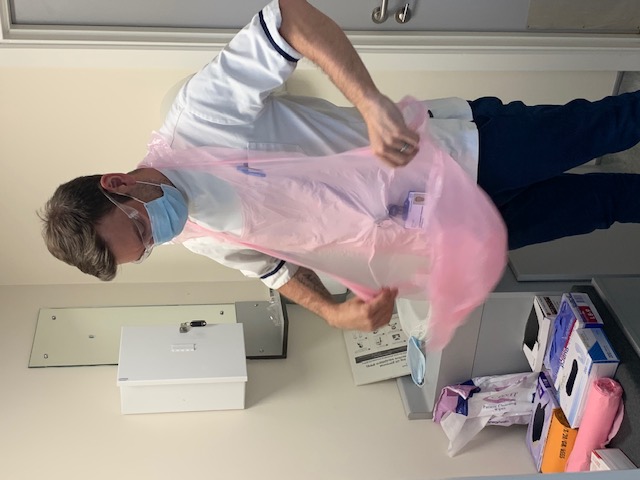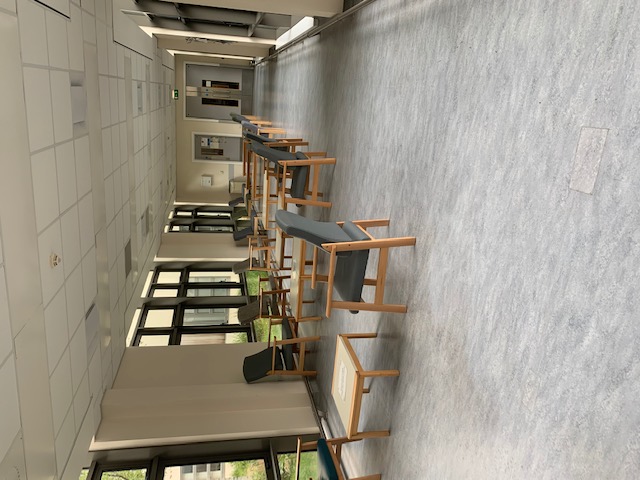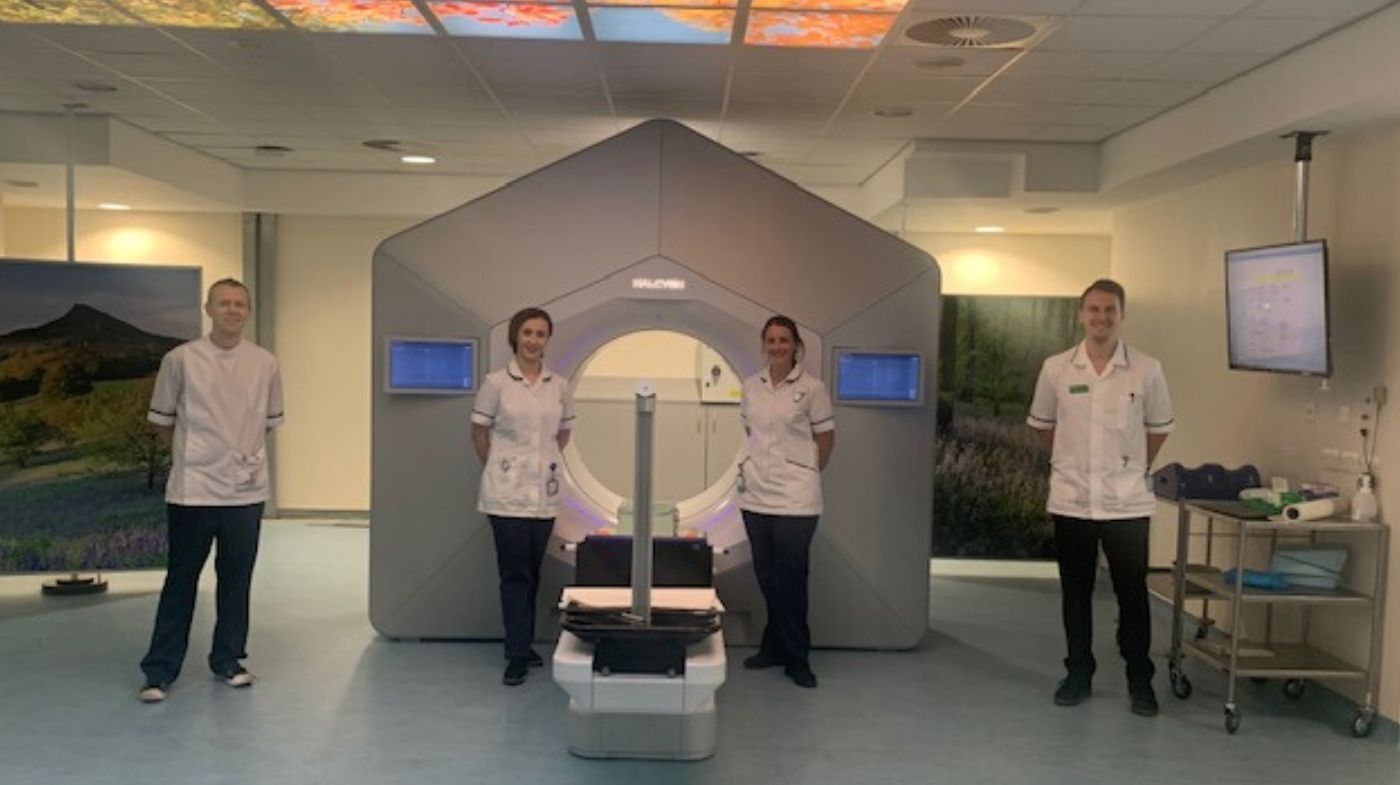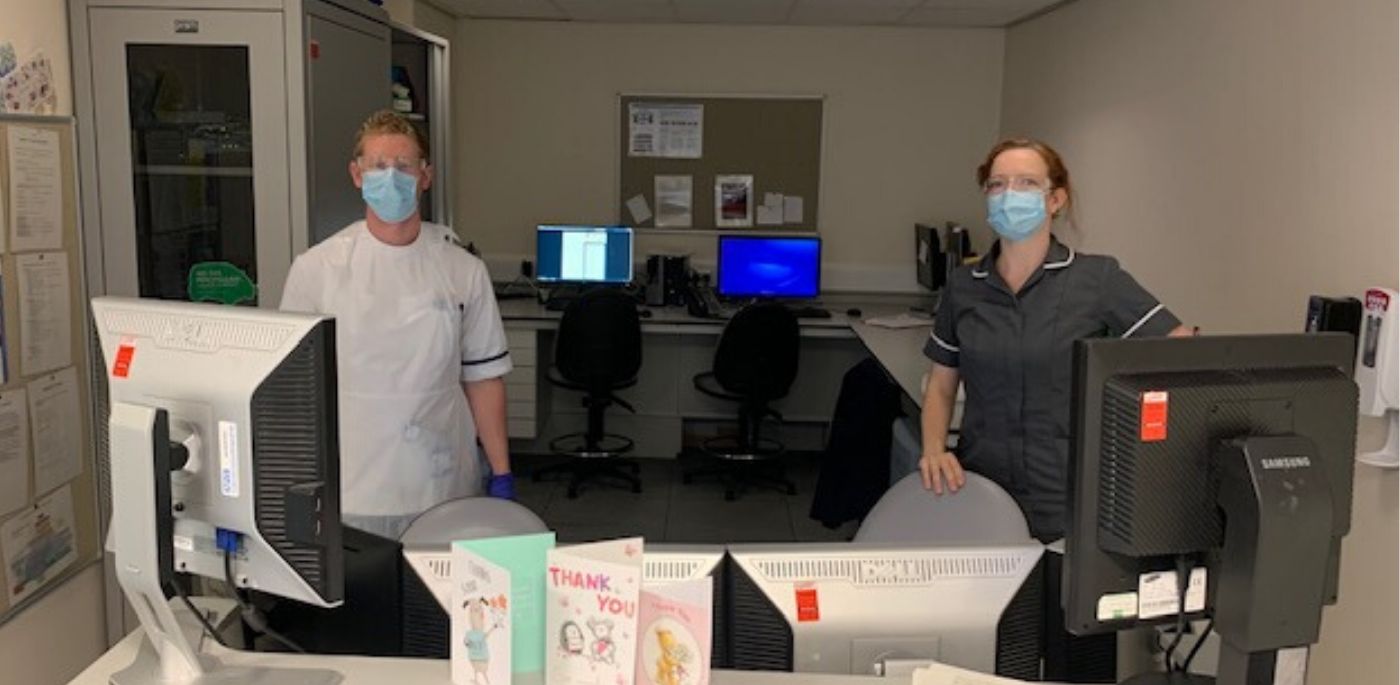Radiotherapy team pulls out all the stops to ensure cancer treatments continue
As many hospitals look to re-start some elements of cancer treatment this week, radiotherapy staff in Hull have revealed how the COVID-19 pandemic has barely slowed them down.
From the outset, Hull University Teaching Hospitals NHS Trust made a commitment to ensuring critical services such and cardiology, stroke services and cancer care would not be adversely affected by the organisation’s coronavirus response.
Now, as trusts up and down the country look to pick up where they left off, therapeutic radiographers at Castle Hill Hospital are keen to explain how their cancer patients have been able to continue their treatments throughout.
Barbara Whitaker, Deputy Radiotherapy Manager says:
“Being told you have cancer and having to start treatment can be worrying enough on their own.

PPE is now part of all pre-treatment preparation
“In early March, the coronavirus outbreak created an added level of anxiety for our patients due to the complications which COVID-19 can cause for vulnerable people and those with low immune systems. Knowing of the Trust commitment to keeping things going, we made it our mission to ensure access to radiotherapy treatment was one less thing for our patients to worry about.”
Armed with personal protective equipment, Castle Hill’s 62-strong team of radiotherapy staff pulled out all the stops to ensure their patients could continue their treatments with the minimum risk.
“The team is really enthusiastic and keen to make things happen, so with some careful planning and using the different skill sets within the wider team, we devised new ways of working. This has meant the service has continued uninterrupted throughout the recent pandemic, and ensured our patients have been able to continue coming to us for their potentially life-saving treatments.”
First up was how to deal with those patients who were particularly immuno-suppressed, so even more susceptible to complications from COVID-19.
“We have opted to see the patients whose cancer is making them particularly unwell at the beginning of the day. The department is always deep cleaned every evening, so this was deemed to be the safest approach for the people at highest risk.

Patients can now wait 2m apart
“For our routine patients, we’ve taken precautionary measures such as spacing our main waiting area out to ensure those waiting for treatment can remain the recommended 2 metres apart, and we have reduced footfall in the department by temporarily relocating the cancer assessment unit which previously shared our space.
”Radiotherapy, nurses and clinical support workers are conducting as much pre-treatment screening as they can over the phone, and patients are then screened again in the department on arrival.”
As for those patients who are symptomatic?
“Members of the team have given up their staff rooms and offices in order to convert them into isolation rooms for patients coming in who are suspected or confirmed as COVID-19 positive,” Barbara continues.
“Being symptomatic doesn’t mean you need your radiotherapy treatment any less, so where it’s still safe for each patient to do so, we’ve been able to continue to deliver their radiotherapy. For everyone’s protection, we use one specific treatment room and we ask those patients to come in towards the end of the day, again to minimise the potential for symptomatic and positive patients to mix with people who aren’t. We then we deep clean the machine and the treatment room after every use.”
Barbara is also quick to commend the flexibility of the team:
“The team has been fantastic over the course of the coronavirus pandemic. Admin and clerical staff have been helping to organise the deep clean of the treatment rooms and organise transfers of patients up from the wards, while many part time staff have offered to work extra hours to cover staffing shortfalls due to colleagues self-isolating. We’re also grateful for the support of the family and women’s health group, who have released three former therapeutic radiographers from the mammography service to refresh their skills and boost our staff numbers again should we need them.

Therapeutic radiographers have worked hard to maintain their service for cancer patients
“Patients needing radiotherapy can come in every day for a period of weeks, so the team get to know their patients and build up really good relationships with them. Wearing the PPE can sometimes feel like the care we provide is a little less personal, but we want our patients to know that we are still smiling behind the masks and we will continue to do all we can to ensure their care continues uninterrupted.”
Clare Hutton, Radiotherapy Manager says:
“Although it might feel to many people like COVID-19 is the sole focus of healthcare right now, life in radiotherapy is still very much business as usual. We’ve obviously had to make some adjustments to ensure the service can run safely through this pandemic and reduce the risk to patients and staff, but ultimately we’ve been able to ensure patients can still make their daily visits to the department and receive the same high quality service as they did before.
“The department may feel a little different as you enter; social distancing has been implemented and face to face contact has reduced, for example, but the vast majority of treatments have remained the same. None of this would be possible without the full support of the team who, as always, take things in their stride and make things work.
“It really has been all hands to the pump to make the transition to our ‘new normal’ work effectively and we’re pleased to say that our patients are continuing to see the benefit of this.”

